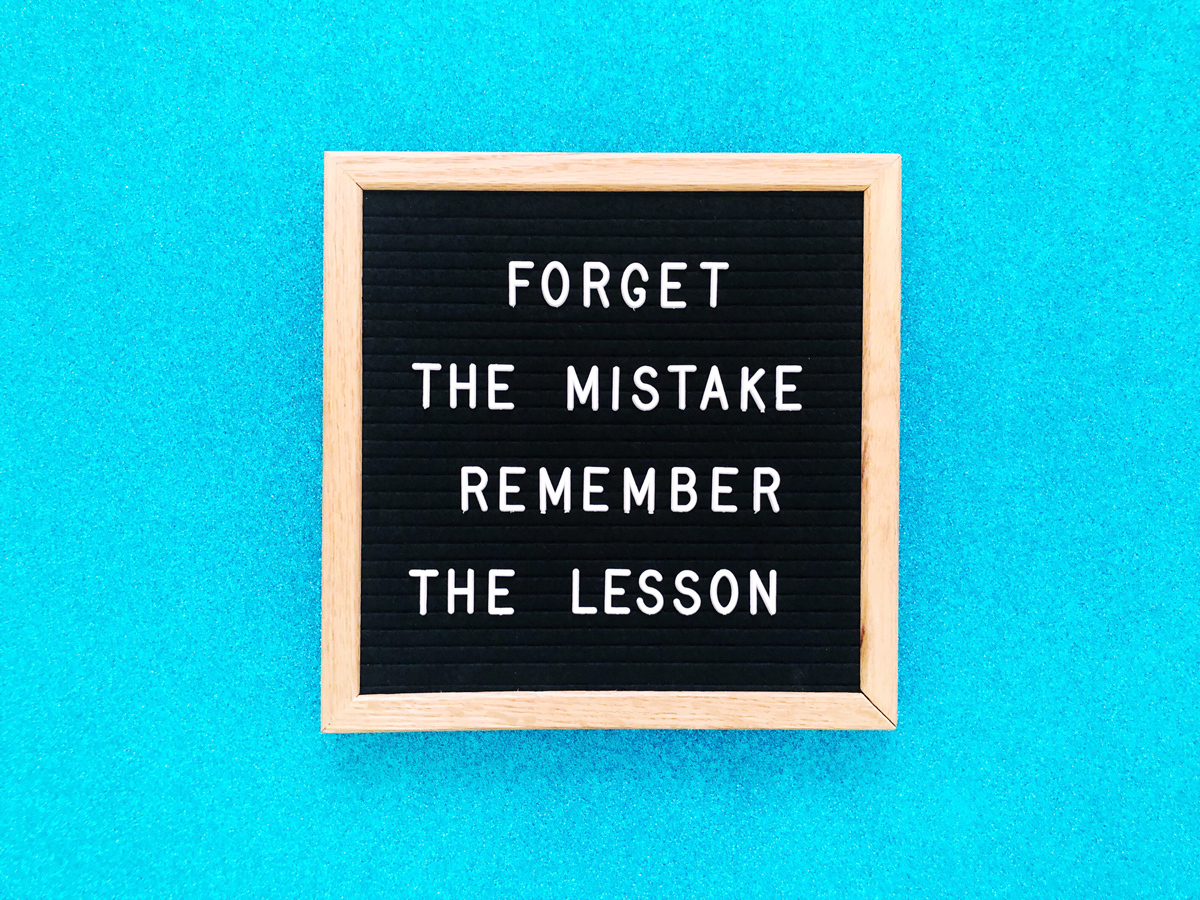How Can You Learn from Your Mistakes?
5 Strategies to Move Forward When You Wish You Could Get a Do-Over
“I shall be telling this with a sigh somewhere ages and ages hence;
Two roads diverged in a wood, and I –
I took the one less traveled by,
And that has made all the difference.”
– Robert Frost, The Road Not Taken
I don’t know about you, but I know I have made some mistakes in my life. I took the wrong path, said the wrong words (sometimes repeatedly), or got stuck in old stories that led me astray. There are at least a few situations and relationships that I look back on and wish I could call a “do-over.” Can you relate?
Of course, many situations do not allow us a “do-over.” As fully human beings, we typically learn to live with the “what if’s,” wondering how things might be different if we had made another choice. We seek ways to adjust to the losses and emotions that come with the mistakes. Maybe you can fill in the blank for your own regrets: “I wish I hadn’t _________________.”
How do you experience mistakes and missteps you’ve made? Gentle self-inquiry can offer openings to explore how you experience this discomfort and how you might enable past missteps to illuminate your life in ways that light your way forward, rather than staying stuck in the dark hallways of “what if’s”.
Psychologists Shelley Carson and Ellen Langer say there are “good mistakes” and “bad mistakes.” What makes the difference is how we respond to them. Good mistakes can teach us valuable lessons. Bad mistakes are the ones we hide from in shame and denial.
I don’t have the answers, but I’d like to offer a few approaches to help you ponder the road not taken. Perhaps these might help you interrupt negative self-messages and inspire you toward generating greater awareness, learning, and inner liberation – a way forward toward inner shifts or outward change.
😊 Consider these approaches…
1. Learning to sit quietly with life’s joys, challenges, and adversities rather than simply seeking to escape. Mindfulness can help us learn to be present in this very moment. Applying mindfulness to a challenging situation can help us nurture self-awareness. While we cannot change the past, we do have choices for our next steps going forward.
A mindful approach can help us notice our thoughts and feelings, meeting them as they arrive, offering spaciousness and compassion for “what is”, and in some cases exploring alternative options for going forward. As we pause in the present moment, noticing our breathing or other anchor points, we may experience greater awareness. We can create space for greater clarity to renew ourselves with the capacity to be present to what is.
2. Steadying ourselves toward greater balance and counterbalance in the midst of life’s tensions through prayer or inspiring text. Some years ago, as a community organizer, I learned the Serenity Prayer, arguably one of the most well-known texts in the U.S. According to the Alcoholics Anonymous website, the prayer was found in the New York Herald Tribune in 1941. Though attributed to theologian Reinhold Niebuhr, it may have been created by the Greek philosopher Aristotle or Dutch philosopher Baruch Spinoza (A.A, 2009)
“God grant me the serenity to accept that which I cannot change,
Courage to change what I can,
And the wisdom to know the difference.”
― Reinhold Niebuhr
3. Inspiring inner healing and outer change with self-compassion. Research shows that self-compassion can markedly help us improve our lives and invigorate our capacities to accept and be with ourselves in more accepting ways (Neff, 2021). According to psychologist Kristen Neff, Ph.D., tender self-compassion empowers us to accept ourselves, a practice that can blossom into what she calls a caring force. Combining strength with love, caring force enables us to expand self-compassion toward compassionate actions motivating change in ourselves and our society. She calls this fierce self-compassion (2021).
- How can you offer yourself compassion as you contemplate where you’ve fallen short?
- How can you offer yourself the space to consider the situation, and how you might create room for learning, growth, and change?
4. Courageous self-exploration. Consider guiding questions, such as:
- What can I learn from this experience?
- If I could walk this path again, what would I DO differently? How would I BE different?
- What do I need to learn or study more about to empower myself to make different choices?
- What advice might I offer to someone else in a similar situation?
- What thoughts, habits, or behaviors might I choose to examine or shift so that I might respond to a similar situation differently next time?
5. What am I stuck with and what might I change? No doubt, some situations are fixable and some are not. Sometimes it’s not easy or even possible to heal a relationship or situation that has been ruptured. Is this a situation that you might be able to shift or change? Be honest with yourself about the damage that’s been done. Is this a simple mistake or comment or a larger pattern of missteps and thoughtlessness?
“We cannot change the cards we are dealt, just how we play the hand.”
― Randy Pausch, The Last Lecture
If you decide to approach the person or situation to attempt healing or repair, remember the importance of listening. Not just hearing, rather listening with the genuine intent to try to understand. After careful listening, you might share with the person what you heard, what you’re learning, and how you will work to get it right going forward.
In his well-known “Last Lecture” (2007), Carnegie Mellon University professor Randy Pausch, Ph.D., offered this advice. “Proper apologies have three parts: 1) What I did was wrong. 2) I feel bad that I hurt you. 3) How do I make this better?”
Send your comments and suggestions to Ilene!
Click here to send Ilene an email with your thoughts about this blog post.
References:
- Alcoholics Anonymous Website – Author Unknown. (2009). Origin of the serenity prayer: A historical paper.
- Carson, S. H., & Langer, E. J. (2006). Mindfulness and self-acceptance. Journal of Rational Emotive & Cognitive Behavior Therapy, 24 (1), 29-43.
- Neff, K. (2021). Fierce self-compassion: How women can harness kindness to speak up, claim their power, and thrive. New York, NY: Harper Wave.
- Pausch, R. (2007). Randy Pausch’s last lecture: Really achieving your childhood dreams. Carnegie Mellon University.
Copyright © 2021 Ilene Berns-Zare, LLC, All Rights Reserved
Ilene is a Featured Author on PsychologyToday!
Read her blog series Flourish and Thrive: Navigating transitions with mindfulness and resilience.

What do you wish you could “do over”?
Tap into your strengths, purpose, and potential to flourish in life and work.
If you’d like to discuss how Ilene Berns-Zare Coaching can help you achieve your goals, Contact Ilene.
Coaching with Ilene Can Help You Call Yourself to Action
Ilene Berns-Zare, PsyD, PCC, CMC (ICF Credentialed) is an Executive and Personal Coach and Speaker. Ilene helps people live their best personal and professional lives by bringing mind, body, and spirit into flow with strengths, purpose, and potential. She inspires clients to find fresh perspectives and access their full potential as creative, resourceful, whole persons. Find Ilene online, set up a free discovery coaching consultation, and access free resources at https://ibzcoaching.com/.
Please share this blog with anyone who might be interested in reading it!
We would love to hear from you! We are interested in your suggestions for this newsletter, your reactions to this one, or providing more information about coaching.




